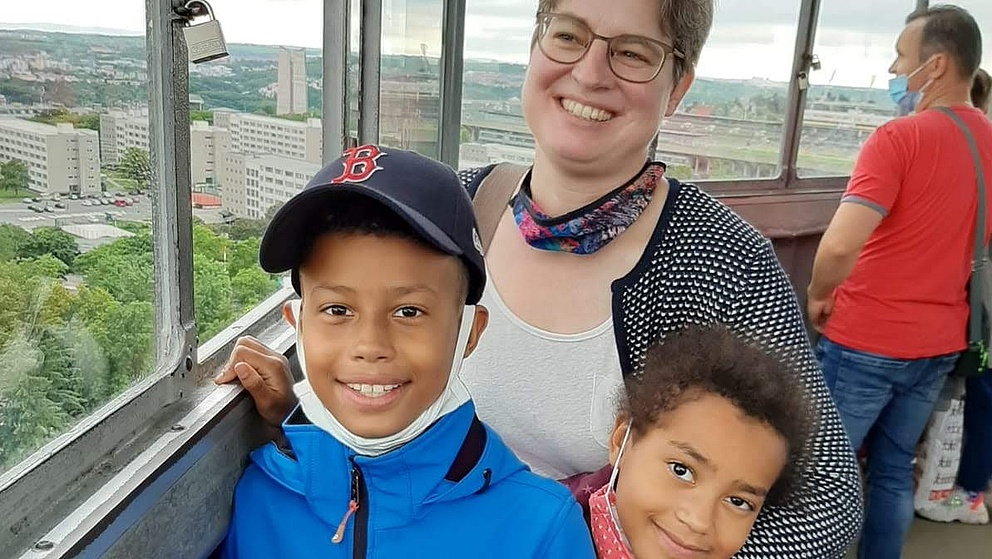

Contact
Press, Communications and Marketing
Tel.: +49 228 833-144
Fax: +49 228 833-441
presse[at]avh.de
A Slavonic studies scholar, two children, a year of research under exceptional conditions - the Feodor Lynen Fellow Gesine Drews-Sylla made the move to Prague with her family. Then came COVID-19 and, with it, the discovery that letting go helps and unexpected challenges can actually advance research.
When Lynen Fellow Gesine Drews-Sylla thinks back on the time she spent working from her home in the Prague suburb Jinonice, she recalls the sweeping view from her huge balcony. And the Vltava River that flows through the valley. And the verdant side of the Czech metropolis. The Slavonics scholar with postdoctoral qualification came to Prague for a year in late summer 2019 with her 8-year-old daughter and 12-year-old son to conduct research as a guest of her collaborative partner Václav Petrbok at the Institute of Czech Literature of the Czech Academy of Sciences. Her husband stayed in Tübingen for business reasons. The family originally planned to “commute” and spend weekends together, alternating between Prague and Tübingen. The year that the scholar was particularly hoping to bring a new perspective to her research brought an entirely unexpected change of perspective – regarding the city and her own research work. “I had just gotten the feeling that the kids and I were settled in and then the pandemic hit”, said Gesine Drews-Sylla. “On Monday I had a city tour, on Wednesday the schools closed and on Sunday the borders were closed. It all happened very fast.”
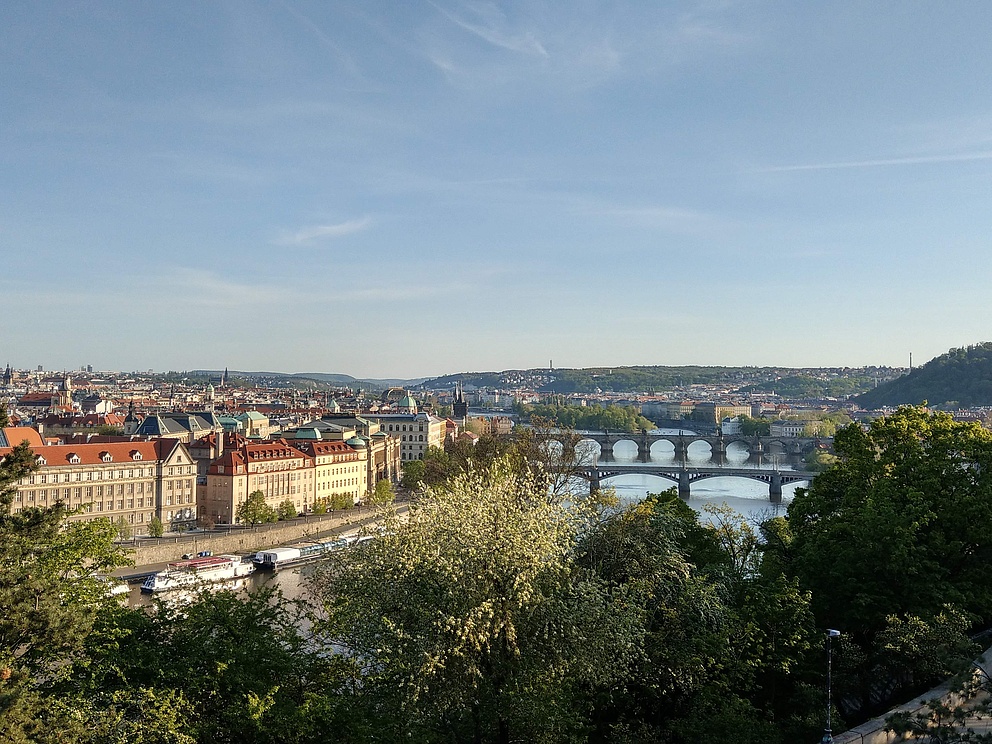
Although the family could have left at any time, it stayed in the country for the time being. “There were hardly any covid cases in Prague in early March 2020. We felt safe. I wanted to remain on location to gather material, improve my Czech and establish contacts,” said the literary and cultural studies scholar Drews-Sylla. Her original plan: Within the scope of a monograph, she wanted to examine how Roma and Romnija are portrayed in contemporary Czech culture and what role the subject of racism and participation plays in the overall culture.
Easy does it
When in March her flat in Prague suddenly became an office for her and, at the same time, a classroom for her children as well, Drews-Sylla had to restructure not only her family life but also her research work. After the border was closed, her husband could not spend the weekends with the family as originally planned. Here and there, the demands arising from childcare and home schooling clashed with her research work. But, like so many other mothers and fathers around the world, Drews-Sylla adjusted her work as well as possible to the new situation. Since working in libraries was no longer possible, she bought a lot of books online. “Of course, all the tourist attractions were closed so we had to organise our free time differently. This unexpectedly led to an entirely new perspective of the city. We bought second-hand bikes and used them to discover corners of the city where we never would have gone but for the pandemic.” For her two children, the year in Prague was exciting and challenging at the same time. Looking back, both think it was worthwhile. They had the opportunity to experience another language, broaden their horizons and make new friends. “At the start I had to put a lot of energy into ensuring that the two get a good start and feel at home in the new city. Fortunately, we met a family through the school very early on and became close friends with them”, said Drews-Sylla.
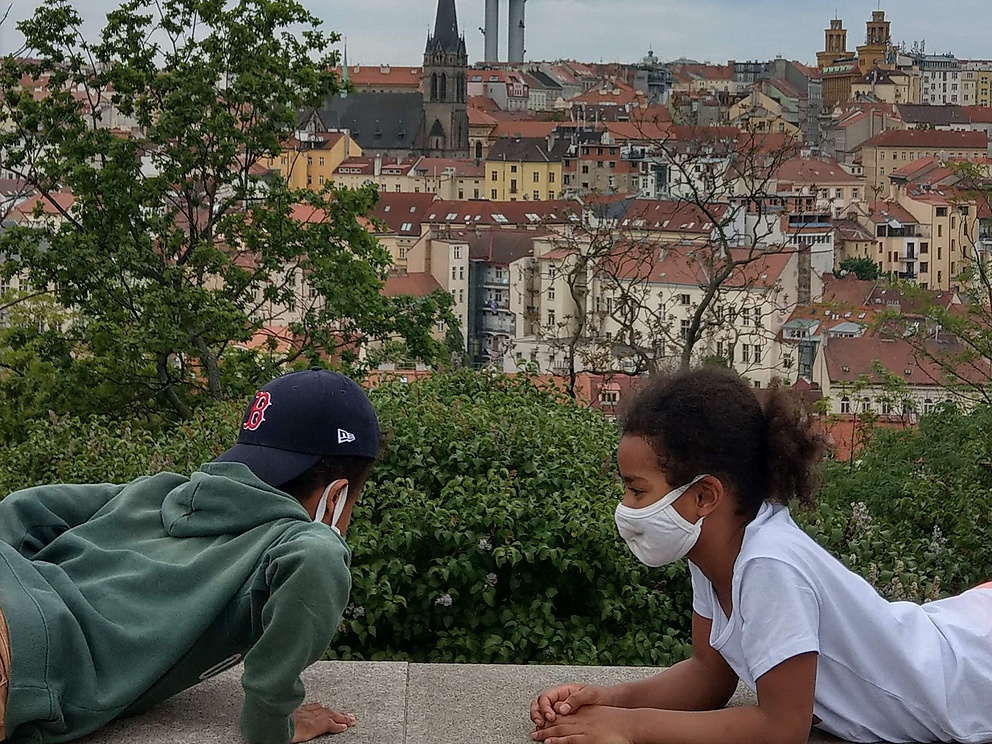
Balancing the demands of family life and a research career still isn’t a matter of course. This is where our programmes step in.
Family-friendly support
The fact that Drews-Sylla could undertake her research stay together with her children was made possible largely through the financial framework offered by Feodor Lynen Fellowships. “It simply would not have been possible without the fact that the Humboldt Foundation covered tuition fees and even provided money for childcare”, said Drews-Sylla. Family-friendliness is an important aspect for the Humboldt Foundation. Of the 142 fellows from Germany who were sponsored in the spring of 2020, 43 had children. Thirty of them took their children with them when they went abroad. Besides family allowances for partners and a flat-rate child allowance, assistance can also include subsidies for childcare costs and extensions to help during parental leave. Monika Lieb, head of division in the Sponsorship and Network Department at the Humboldt Foundation, noted: “Balancing the demands of family life and a research career still isn’t a matter of course. The expectation that the individual researcher works full-time or even more than the usual number of working hours just doesn’t reflect the reality of family life. This is where our programmes step in."
Important visibility
Drew-Sylla, who looked after her two children by herself while in Prague, also found it challenging to strike a balance between research and family life during the pandemic. Her most important insight: “Even if it was really a lot of work from time to time to meet both sets of demand, I made an amazing amount of progress with my work.” What she also learned during these months: “You sometimes just have to let things go. I often simply had to somehow let things take care of themselves.
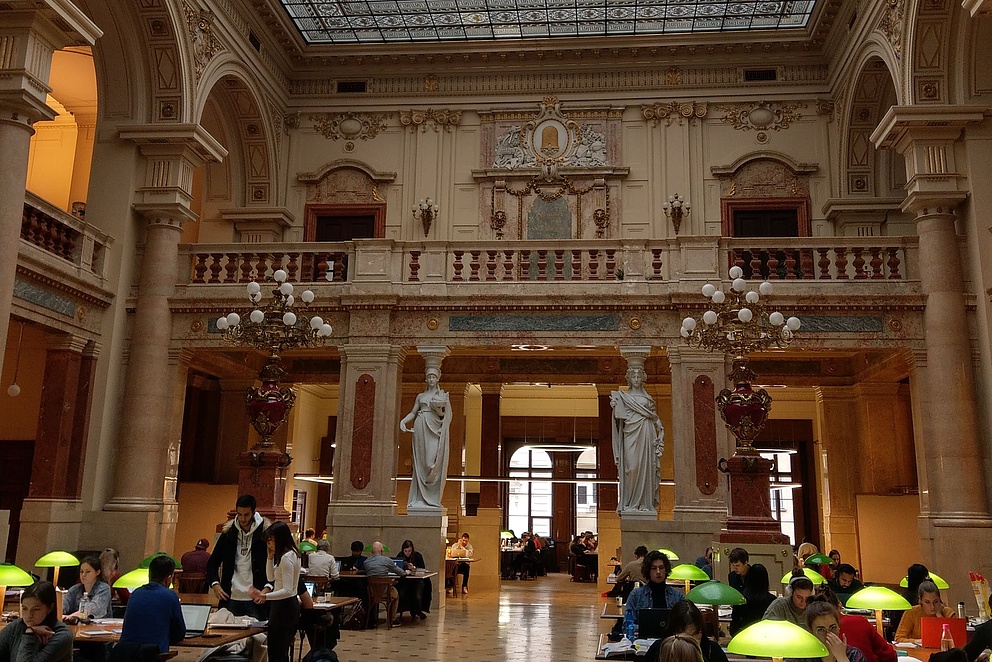
At the start of the pandemic, Drews-Sylla read a Facebook post by a colleague who wrote: “So what am I doing with all this free time? I’m writing a 100-page article.” Drews-Sylla: “I read that and felt really frustrated. The one thing that I couldn’t do between home schooling and taking care of the children was to write." Drews-Sylla didn’t submit any articles during that time. Many other researchers around the world had similar experiences as well which they reported on in social media under the hashtag #coronapublicationgap. It is not yet clear how the pandemic might impact female researchers’ careers. “One thing that covid has changed for the better: Thanks to the images of children darting around or researchers who have to leave a meeting early in order to cook lunch, it has brought attention to the fact that many researchers have families and that balancing the demands of work with the demands of family life continues to be an issue”, said Head of Division Lieb.
For Drews-Sylla the pandemic year was ultimately successful despite all the difficulties. She decided to return to Germany in summer 2020. This was to ensure that in view of the pandemic situation her children could return to their old surroundings for the start of the new school year. In addition Drews-Sylla applied to the Deutsche Forschungsgemeinschaft for a Heisenberg position which she was able to take up at the University of Tübingen’s Institute of Slavic Languages and Literatures. In the spring of 2021 Drews-Sylla received a call from the University of Würzburg. There she now holds the chair for Russian Literature and Culture. “This has made a dream come true for me to finally arrive after years of existential insecurity. The Feodor Lynen Fellowship and my stay abroad were surely a factor in this”, said Drews-Sylla. She really misses the time she spent in Prague and keeps in touch with her colleagues at the Czech Academy of Sciences and the Romani Studies department at Charles University in Prague. She’s currently learning Romani, the language of the Roma, through an online course there. “Without the pandemic, it would never have occurred to me that this might be possible”, said Drews-Sylla. And even though she can’t yet foresee in what form she will continue her fellowship one day, the scholar is convinced: “That year was the start of something. And Prague is not far away.”
Author: Esther Sambale

The Feodor Lynen Research Fellowship
supports you – postdoc or experienced researcher – with your research project abroad, even during the Coronavirus pandemic.
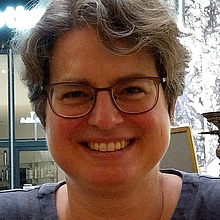
Prof. Dr Gesine Drews-Sylla obtained her post-doctoral qualification at the University of Tübingen in 2018 in Slavic Literature and Cultural Studies and in General and Comparative Literary Studies on the subject “Between Moscow and Dakar: Literary, Cinematic and Cultural Interlinkages”. As the recipient of a Feodor Lynen Research Fellowship for experienced researchers, she spent a year as a guest of the Institute for Czech Literature at the Czech Academy of Sciences. She was accepted for the DFG’s Heisenberg Programme in 2020. She has been chair of Russian Literature and Culture at the University of Würzburg since 2021.
